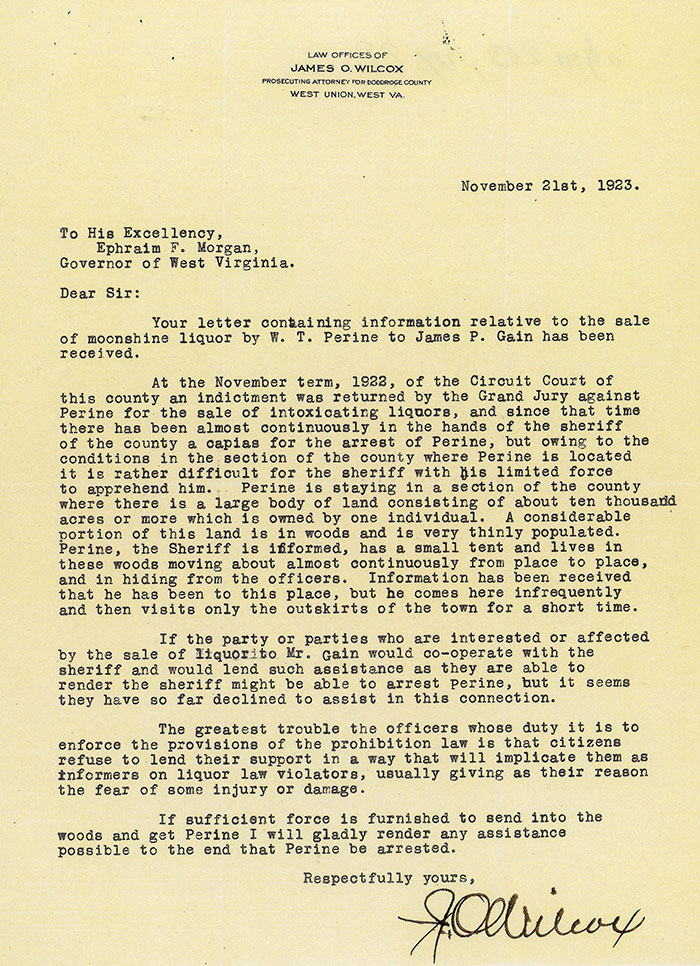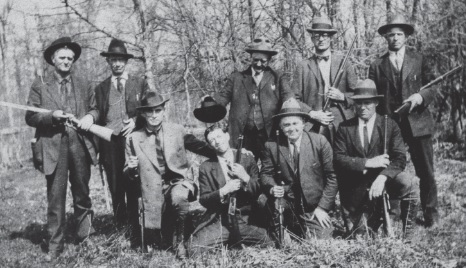A Snapshot of the Prohibition Era in West Virginia
Posted by Jane Metters LaBarbara.May 8th, 2019
Blog post by Michael Ridderbusch, Associate Curator, WVRHC.
Recently, while working the reference desk in the Manuscripts Room at the History Center, I browsed the papers of West Virginia Governor Ephraim Morgan (1921-1925) that had been retrieved for a researcher and discovered a couple items of historical interest. While the era of the early 1920s was a time in which Governor Ephraim’s attention was focused on the conflict between labor and management in the coal industry, a conflict known as the “mine wars,” it was also a time of prohibition in America, so it wasn’t surprising to discover letters in the collection related to its enforcement.
One of the noteworthy items I found is a letter of 21 November 1923 by James Wilcox, the Prosecuting Attorney of Doddridge County, to Governor Morgan. The letter explains why a year long effort to arrest a moonshiner hiding in the woods had so far been a failure. He notes that “citizens refuse to lend their support in a way that will implicate them as informers … usually giving as their reason the fear of some injury or damage.”

(Letter from Wilcox to Morgan,
Collection A&M 0203, Ephraim F. Morgan (1869-1950) Papers, Box 22.)
The reluctance of locals to inform on moonshiners described here is consistent with the findings of Jason Sumich of Appalachian State University, who conducted a field study on moonshining in North Carolina in September 1997:
“I spent a month doing fieldwork in Alleghany County, NC. I was surprised at the ambivalence in peoples’ attitudes toward moonshiners. Some moonshiners were considered common criminals, but most were not viewed negatively. Even people who strongly adhere to the local religious code which is anti-alcohol were on a friendly, first-name basis with many unrepentant former moonshiners.”
In another letter I discovered dated 23 November 1923, we learn that William G. Brown, the State Commissioner of Prohibition, was impatient with James Wilcox, the Prosecuting Attorney of Doddridge County. In this letter to Governor Morgan, Brown claims that Wilcox wasn’t interested in prosecuting liquor violations! Although a lawyer from Nicholas County, West Virginia, Brown (unlike Wilcox) appears to be out of touch with the realities of prohibition in the culture of Appalachia. Brown was idealistic and zealous, and had proclaimed that “in another generation, liquor will have disappeared, not merely from our politics, but from our memories.”
This local story plausibly fits a larger pattern in the history of prohibition, where the dry faction on the national level exhibited a similar idealism and zealousness to prosecute, which in turn contributed to the unraveling of prohibition.
When the Republican victory in the presidential election of 1928 was seen as a mandate for the dry agenda, Congress passed the Jones Law, which turned most Volstead Act violations from misdemeanors into felonies. This strategy of applying harsher penalties, however, failed in its intent to promote respect for the law, and provided wet journalists an opportunity to pass judgement on the national experiment of Prohibition. An extreme was reached when a Mrs. Miller in Michigan was sentenced to life in prison for selling an undercover policeman two pints of liquor, since Michigan mandated a life sentence upon a fourth violation of the liquor laws!
Discoveries like the letters presented here are made regularly in collections at the History Center by staff and researchers, leading to new perspectives on the past.

(Photograph of WV Prohibition Agents from ca. 1925
from Goldenseal magazine, Winter 2017.)
offline sources consulted:
1. “Last Call” by Daniel Okrent, 2010. (Includes information regarding the Jones Law.)
2. A&M 0203, Ephraim F. Morgan (1869-1950) Papers, Box 22, letter of 21 November 1923.
3. A&M 0203, Ephraim F. Morgan (1869-1950) Papers, Box 22, letter of 23 November 1923.
4. “The Revenooers, Enforcing Prohibition in West Virginia” by Merle T. Cole in “Goldenseal”, Winter 2017. (Includes information on William G. Brown.)
online sources consulted:
1. Appalachian State University, Department of Anthropology, Ethnographic Field Study in Southern Appalachia, “It’s All Legal Until You Get Caught: Moonshining in the Southern Appalachians” by Jason Sumich, 1997. https://anthro.appstate.edu/research/field-schools/ethnographic-and-linguistic-field-schools/summer-2007-alleghany-county
2. West Virginia Encyclopedia:
Ephraim Franklin Morgan
3. Wikipedia:
Increased Penalties Act (Includes information regarding the Jones Law.)
Prohibition in the United States
Volstead Act





